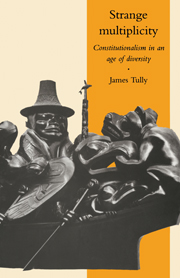Book contents
- Frontmatter
- Contents
- Preface
- Acknowledgements
- Illustration: ‘The spirit of Haida Gwaii’
- 1 Demands for constitutional recognition
- 2 Diversity and contemporary constitutionalism
- 3 The historical formation of modern constitutionalism: the empire of uniformity
- 4 The historical formation of common constitutionalism: the rediscovery of cultural diversity, part 1
- 5 The historical formation of common constitutionalism: the rediscovery of cultural diversity, part II
- 6 Constitutionalism in an age of cultural diversity
- Notes
- Guide to further reading
- Bibliography
- Index
1 - Demands for constitutional recognition
Published online by Cambridge University Press: 05 June 2012
- Frontmatter
- Contents
- Preface
- Acknowledgements
- Illustration: ‘The spirit of Haida Gwaii’
- 1 Demands for constitutional recognition
- 2 Diversity and contemporary constitutionalism
- 3 The historical formation of modern constitutionalism: the empire of uniformity
- 4 The historical formation of common constitutionalism: the rediscovery of cultural diversity, part 1
- 5 The historical formation of common constitutionalism: the rediscovery of cultural diversity, part II
- 6 Constitutionalism in an age of cultural diversity
- Notes
- Guide to further reading
- Bibliography
- Index
Summary
The constitutional question raised by the politics of cultural recognition: six examples and three similarities
The question I wish to address in this book is the following. Can a modern constitution recognise and accommodate cultural diversity? This is one of the most difficult and pressing questions of the political era we are entering at the dawn of the twenty-first century. The question can even be said to characterise the coming era, for when it is not described in relation to the preceding period, as a postimperial or post-modern age, it is often described in its own terms, as an age of cultural diversity. The question is not whether one should be for or against cultural diversity. Rather, it is the prior question of what is the critical attitude or spirit in which justice can be rendered to the demands for cultural recognition.
We can begin to gain an initial grasp of this elusive question by briefly surveying the range of political struggles which have rendered cultural diversity problematic, causing it to become a locus of political action and philosophical reflection. In contemporary political vocabulary, the various struggles for recognition of cultural diversity are classified as different in kind and studied by different specialists. There is no single term which covers them all. As a result, whatever similarities and differences in degree, rather than in kind, may exist among them are hidden from view by our ordinary forms of language.
- Type
- Chapter
- Information
- Strange MultiplicityConstitutionalism in an Age of Diversity, pp. 1 - 29Publisher: Cambridge University PressPrint publication year: 1995



